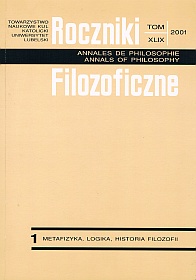Self-sufficiency of the ultimate good in Plato’s, Aristotle’s and Thomas Aquinas’ works
Abstract
The subject of the article is the condition of self-sufficiency (autarchy) as the criterion of the ultimate good. This criterion first appears in Plato’s Philebus, and then it is used by Aristotle. According to the characterization of the ultimate good contained in the seventh chapter of Book I of Nicomachean E th ic s, the self-sufficient good has to be sufficient, that is it has to be a good that does not leave any unfulfilled desires, and at the same time is axiologically superior, that is surpassing all other kinds of good with its value. This condition for axiological superiority allows two interpretations: the absolutist and the relativist ones. The absolute superiority would be vested in the ultimate good if it was unsurpassable, that is if it was a good whose value cannot be increased by adding some other good to it. The relative superiority of the ultimate good only requires that it surpasses with its value every good that is completely different from it, e.g. does not comprise it as its component. A clearly relativist interpretation of the Aristotelian condition of self-sufficiency as the criterion of the ultimate good that can be achieved in human life is proposed by St. Thomas Aquinas in his commentary on Nicomachean Ethics. Although he also does not reject the concept of self-sufficient good that is not a component of a sum of goods that have an even higher value, he treats self-sufficiency understood in this absolute way as a characteristic of Go d ’s good.
References
Aristoteles , Nikomachische Ethik, Auf der Grundlage der Übersetzung v. E. Rolfes, herausgegeben v. G. Bien, Hamburg 1985.
Arystoteles , Etyka eudemejska, przeł. W. Wróblewski, w: Arystoteles , Dzieła wszystkie, t. V. Warszawa: PWN 1996.
Arystoteles , Etyka nikomachejska, przeł. D. Gromska, w: Arystote1es, Dzieła wszystkie. t. V, Warszawa: PWN 1996.
Moline J., Plato on the complexity of the psyche, „Archiv für Geschichte der Philosophie". 60(1978).
Platon . F ile b , przeł. W. Witwicki, Warszawa 1963.
Platon . Państwo, przeł. W. Witwicki, w: Platon , Państwo. Prawa (VII ksiąg), wyd. 2, Kęty: Wydawnictwo Antyk 1999.
Tomasz z Akwinu , In decem libros Ethicorum Aristotelis ad Nicomachean expositio. cura et studio R. M. Spazzi, Torino 1949.
Tomasz z Akwinu , Summa Theologiae, Pars Prima Secundae, cura et studio sac. Petri Caramello, Taurini: Marietti 1952.
Tomasz z Akwinu , O celu ostatecznym, czyli o szczęściu, w: tenże , Suma teologiczna, t. IX. przeł. O. F. W. Bednarski OP. Londyn 1963.
Copyright (c) 2001 Roczniki Filozoficzne

This work is licensed under a Creative Commons Attribution-NonCommercial-NoDerivatives 4.0 International License.





